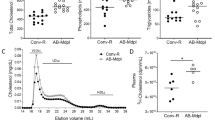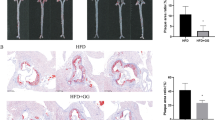Abstract
Hypercholesterolemia plays a critical role in the development of atherosclerosis and cardiovascular diseases. Many works have been reported that gut microbiota could affect hypercholesterolemia through cholesterol metabolism. However, the role of gut microbiota on cholesterol transportation remains unclear. In this study, 8-week-old C57BL/6J mice were fed with high-cholesterol diet to build the hypercholesterolemic mice. Then, the hypercholesterolemic mice got the oral administration of Enterococcus faecalis ATCC19433 at a dose of 109 CFU/mL/day or PBS with high-cholesterol diet for 4 weeks. Serum was collected to detect the concentration of total cholesterol (TC). Meanwhile, pathology, histology, real-time polymerase chain reaction, Western blot, and immunofluorescence were used to evaluate the expression of ABCG5 and ABCG8 in the liver and small intestine. We also analyzed the composition of gut microbiota through high-throughput sequencing method. Oral administration of E. faecalis ATCC19433 significantly decreased the concentration of serum cholesterol in hypercholesterolemic mice. Furthermore, E. faecalis ATCC19433 reduced the concentration of liver cholesterol and improved cholesterol by increasing the expression of ABCG5 and ABCG8. Moreover, oral administration of E. faecalis ATCC19433 modulated the composition of gut microbiota and increased the counts of Lactobacillus, Bifidobacterium, and Akkermansia. Our results showed that E. faecalis ATCC19433 could exert hypocholesterolemic effect on hypercholesterolemic mice by improving transporter ABCG5 and ABCG8. E. faecalis ATCC19433 maybe contribute to the transportation of cholesterol potentially and modulate the composition of gut microbiota.





Similar content being viewed by others
References
Arellano-Martinez GL, Granados O, Palacios-Gonzalez B, Torres N, Medina-Vera I, Tovar AR (2014) Soya protein stimulates bile acid excretion by the liver and intestine through direct and indirect pathways influenced by the presence of dietary cholesterol. Br J Nutr 111(12):2059–2066. https://doi.org/10.1017/S0007114514000361
Berge KE, Tian H, Graf GA, Yu L, Grishin NV, Schultz J, Kwiterovich P, Shan B, Barnes R, Hobbs HH (2000) Accumulation of dietary cholesterol in sitosterolemia caused by mutations in adjacent ABC transporters. Science 290(5497):1771–1775
Brodmann T, Endo A, Gueimonde M, Vinderola G, Kneifel W, de Vos WM, Salminen S, Gomez-Gallego C (2017) Safety of novel microbes for human consumption: practical examples of assessment in the European Union. Front Microbiol 8:1725. https://doi.org/10.3389/fmicb.2017.01725
Calpe-Berdiel L, Escola-Gil JC, Ribas V, Navarro-Sastre A, Garces-Garces J, Blanco-Vaca F (2005) Changes in intestinal and liver global gene expression in response to a phytosterol-enriched diet. Atherosclerosis 181(1):75–85. https://doi.org/10.1016/j.Atherosclerosis.2004.11.025
Carden TJ, Hang J, Dussault PH, Carr TP (2015) Dietary plant sterol esters must be hydrolyzed to reduce intestinal cholesterol absorption in hamsters. J Nutr 145(7):1402–1407. https://doi.org/10.3945/jn.114.207662
Cavallini DC, Bedani R, Bomdespacho LQ, Vendramini RC, Rossi EA (2009) Effects of probiotic bacteria, isoflavones and simvastatin on lipid profile and atherosclerosis in cholesterol-fed rabbits: a randomized double-blind study. Lipids Health Dis 8(1):1. https://doi.org/10.1186/1476-511X-8-1
Cheng BH, Sheen LY, Chang ST (2018) Hypolipidemic effects of S-(+)-linalool and essential oil from Cinnamomum osmophloeum ct. linalool leaves in mice. J Tradit Complement Med 8(1):46–52. https://doi.org/10.1016/j.jtcme.2017.02.002
De Beer MC, Wroblewski JM, Noffsinger VP, Rateri DL, Howatt DA, Balakrishnan A, Ji A, Shridas P, Thompson JC, van der Westhuyzen DR, Tannock LR, Daugherty A, Webb NR, De Beer FC (2014) Deficiency of endogenous acute phase serum amyloid A does not affect atherosclerotic lesions in apolipoprotein E-deficient mice. Arterioscler Thromb Vasc Biol 34(2):255–261. https://doi.org/10.1161/ATVBAHA.113.302247
Dieter MZ, Maher JM, Cheng X, Klaassen CD (2004) Expression and regulation of the sterol half-transporter genes ABCG5 and ABCG8 in rats. Comp Biochem Physiol Toxicol Pharmacol 139(4):209–218. https://doi.org/10.1016/j.cca.2004.11.002
Everard A, Lazarevic V, Derrien M, Girard M, Muccioli GG, Neyrinck AM, Possemiers S, Van Holle A, Francois P, de Vos WM, Delzenne NM, Schrenzel J, Cani PD (2011) Responses of gut microbiota and glucose and lipid metabolism to prebiotics in genetic obese and diet-induced leptin-resistant mice. Diabetes 60(11):2775–2786. https://doi.org/10.2337/db11-0227
Fukushima M, Nakano M (1996) Effects of a mixture of organisms, Lactobacillus acidophilus or Streptococcus faecalis on cholesterol metabolism in rats fed on a fat- and cholesterol-enriched diet. Br J Nutr 76(6):857–867
Gilliland SE, Nelson CR, Maxwell C (1985) Assimilation of cholesterol by Lactobacillus acidophilus. Appl Environ Microbiol 49(2):377–381
Goodman AL, Kallstrom G, Faith JJ, Reyes A, Moore A, Dantas G, Gordon JI (2011) Extensive personal human gut microbiota culture collections characterized and manipulated in gnotobiotic mice. Proc Natl Acad Sci U S A 108(15):6252–6257. https://doi.org/10.1073/pnas.1102938108
Hill C, Guarner F, Reid G, Gibson GR, Merenstein DJ, Pot B, Morelli L, Canani RB, Flint HJ, Salminen S, Calder PC, Sanders ME (2014) Expert consensus document. The International Scientific Association for Probiotics and Prebiotics consensus statement on the scope and appropriate use of the term probiotic. Nat Rev Gastroenterol Hepatol 11(8):506–514. https://doi.org/10.1038/nrgastro.2014.66
Ijaz MU, Ahmed MI, Zou X, Hussain M, Zhang M, Zhao F, Xu X, Zhou G, Li C (2018) Beef, casein, and soy proteins differentially affect lipid metabolism, triglycerides accumulation and gut microbiota of high-fat diet-fed C57BL/6J mice. Front Microbiol 9:2200. https://doi.org/10.3389/fmicb.2018.02200
Klein G, Pack A, Bonaparte C, Reuter G (1998) Taxonomy and physiology of probiotic lactic acid bacteria. Int J Food Microbiol 41(2):103–125
Kondoh M, Shimada T, Fukada K, Morita M, Katada K, Higashimura Y, Mizushima K, Okamori M, Naito Y, Yoshikawa T (2014) Beneficial effects of heat-treated Enterococcus faecalis FK-23 on high-fat diet-induced hepatic steatosis in mice. Br J Nutr 112(6):868–875. https://doi.org/10.1017/S0007114514001792
Kubeck R, Bonet-Ripoll C, Hoffmann C, Walker A, Muller VM, Schuppel VL, Lagkouvardos I, Scholz B, Engel KH, Daniel H, Schmitt-Kopplin P, Haller D, Clavel T, Klingenspor M (2016) Dietary fat and gut microbiota interactions determine diet-induced obesity in mice. Mol Metab 5(12):1162–1174. https://doi.org/10.1016/j.molmet.2016.10.001
Lee JY, Kinch LN, Borek DM, Wang J, Urbatsch IL, Xie XS, Grishin NV, Cohen JC, Otwinowski Z, Hobbs HH, Rosenbaum DM (2016) Crystal structure of the human sterol transporter ABCG5/ABCG8. Nature 533(7604):561–564. https://doi.org/10.1038/nature17666
Li W, Huang D, Gao A, Yang X (2016) Stachyose increases absorption and hepatoprotective effect of tea polyphenols in high fructose-fed mice. Mol Nutr Food Res 60(3):502–510. https://doi.org/10.1002/mnfr.201500547
Liu Y, Zhang Y, Zhang X, Xu Q, Yang X, Xue C (2017) Medium-chain fatty acids reduce serum cholesterol by regulating the metabolism of bile acid in C57BL/6J mice. Food Funct 8(1):291–298. https://doi.org/10.1039/c6fo01207h
Lopes BP, Gaique TG, Souza LL, Paula GS, Kluck GE, Atella GC, Gomes AC, Simas NK, Kuster RM, Ortiga-Carvalho TM, Pazos-Moura CC, Oliveira KJ (2015) Cinnamon extract improves the body composition and attenuates lipogenic processes in the liver and adipose tissue of rats. Food Funct 6(10):3257–3265. https://doi.org/10.1039/c5fo00569h
Lu K, Lee MH, Yu H, Zhou Y, Sandell SA, Salen G, Patel SB (2002) Molecular cloning, genomic organization, genetic variations, and characterization of murine sterolin genes Abcg5 and Abcg8. J Lipid Res 43(4):565–578
Martinez I, Wallace G, Zhang C, Legge R, Benson AK, Carr TP, Moriyama EN, Walter J (2009) Diet-induced metabolic improvements in a hamster model of hypercholesterolemia are strongly linked to alterations of the gut microbiota. Appl Environ Microbiol 75(12):4175–4184. https://doi.org/10.1128/AEM.00380-09
Mathew AG, Chattin SE, Robbins CM, Golden DA (1998) Effects of a direct-fed yeast culture on enteric microbial populations, fermentation acids, and performance of weanling pigs. J Anim Sci 76(8):2138–2145
Nueno-Palop C, Narbad A (2011) Probiotic assessment of Enterococcus faecalis CP58 isolated from human gut. Int J Food Microbiol 145(2–3):390–394. https://doi.org/10.1016/j.ijfoodmicro.2010.12.029
Nunes VS, Leanca CC, Panzoldo NB, Parra E, Cazita PM, Nakandakare ER, de Faria EC, Quintao EC (2011) HDL-C concentration is related to markers of absorption and of cholesterol synthesis: study in subjects with low vs. high HDL-C. Clin Chim Acta, Int J Clin Chem 412(1–2):176–180. https://doi.org/10.1016/j.cca.2010.09.039
Park YH, Kim JG, Shin YW, Kim SH, Whang KY (2007) Effect of dietary inclusion of Lactobacillus acidophilus ATCC 43121 on cholesterol metabolism in rats. J Microbiol Biotechnol 17(4):655–662
Plump AS, Smith JD, Hayek T, Aalto-Setala K, Walsh A, Verstuyft JG, Rubin EM, Breslow JL (1992) Severe hypercholesterolemia and atherosclerosis in apolipoprotein E-deficient mice created by homologous recombination in ES cells. Cell 71(2):343–353
Prakash S, Tomaro-Duchesneau C, Saha S, Cantor A (2011) The gut microbiota and human health with an emphasis on the use of microencapsulated bacterial cells. J Biomed Biotechnol 2011:981214. https://doi.org/10.1155/2011/981214
Rawls JF, Samuel BS, Gordon JI (2004) Gnotobiotic zebrafish reveal evolutionarily conserved responses to the gut microbiota. Proc Natl Acad Sci U S A 101(13):4596–4601. https://doi.org/10.1073/pnas.0400706101
Ross R (1993) The pathogenesis of atherosclerosis: a perspective for the 1990s. Nature 362(6423):801–809. https://doi.org/10.1038/362801a0
Slatis K, Gafvels M, Kannisto K, Ovchinnikova O, Paulsson-Berne G, Parini P, Jiang ZY, Eggertsen G (2010) Abolished synthesis of cholic acid reduces atherosclerotic development in apolipoprotein E knockout mice. J Lipid Res 51(11):3289–3298. https://doi.org/10.1194/jlr.M009308
Togawa N, Takahashi R, Hirai S, Fukushima T, Egashira Y (2013) Gene expression analysis of the liver and skeletal muscle of psyllium-treated mice. Br J Nutr 109(3):383–393. https://doi.org/10.1017/S0007114512001250
Tryndyak VP, Han T, Muskhelishvili L, Fuscoe JC, Ross SA, Beland FA, Pogribny IP (2011) Coupling global methylation and gene expression profiles reveal key pathophysiological events in liver injury induced by a methyl-deficient diet. Mol Nutr Food Res 55(3):411–418. https://doi.org/10.1002/mnfr.201000300
Turnbaugh PJ, Ley RE, Mahowald MA, Magrini V, Mardis ER, Gordon JI (2006) An obesity-associated gut microbiome with increased capacity for energy harvest. Nature 444(7122):1027–1031. https://doi.org/10.1038/nature05414
Usman HA (2000) Effect of administration of Lactobacillus gasseri on serum lipids and fecal steroids in hypercholesterolemic rats. J Dairy Sci 83(8):1705–1711. https://doi.org/10.3168/jds.S0022-0302(00)75039-9
van Winsen RL, Keuzenkamp D, Urlings BA, Lipman LJ, Snijders JA, Verheijden JH, van Knapen F (2002) Effect of fermented feed on shedding of Enterobacteriaceae by fattening pigs. Vet Microbiol 87(3):267–276
Wang Y, Xu N, Xi A, Ahmed Z, Zhang B, Bai X (2009) Effects of Lactobacillus Plantarum MA2 isolated from Tibet kefir on lipid metabolism and intestinal microflora of rats fed on high-cholesterol diet. Appl Microbiol Biotechnol 84(2):341–347. https://doi.org/10.1007/s00253-009-2012-x
Wang J, Mitsche MA, Lutjohann D, Cohen JC, Xie XS, Hobbs HH (2015) Relative roles of ABCG5/ABCG8 in liver and intestine. J Lipid Res 56(2):319–330. https://doi.org/10.1194/jlr.M054544
Wilson MD, Rudel LL (1994) Review of cholesterol absorption with emphasis on dietary and biliary cholesterol. J Lipid Res 35(6):943–955
Wilund KR, Yu L, Xu F, Hobbs HH, Cohen JC (2004) High-level expression of ABCG5 and ABCG8 attenuates diet-induced hypercholesterolemia and atherosclerosis in Ldlr-/- mice. J Lipid Res 45(8):1429–1436. https://doi.org/10.1194/jlr.M400167-JLR200
Yu L, Hammer RE, Li-Hawkins J, Von Bergmann K, Lutjohann D, Cohen JC, Hobbs HH (2002a) Disruption of Abcg5 and Abcg8 in mice reveals their crucial role in biliary cholesterol secretion. Proc Natl Acad Sci U S A 99(25):16237–16242. https://doi.org/10.1073/pnas.252582399
Yu L, Li-Hawkins J, Hammer RE, Berge KE, Horton JD, Cohen JC, Hobbs HH (2002b) Overexpression of ABCG5 and ABCG8 promotes biliary cholesterol secretion and reduces fractional absorption of dietary cholesterol. J Clin Invest 110(5):671–680. https://doi.org/10.1172/JCI16001
Zhang LS, Xu M, Yang Q, Lou D, Howles PN, Tso P (2015) ABCG5/G8 deficiency in mice reduces dietary triacylglycerol and cholesterol transport into the lymph. Lipids 50(4):371–379. https://doi.org/10.1007/s11745-015-3995-y
Zhao L (2013) The gut microbiota and obesity: from correlation to causality. Nat Rev Microbiol 11(9):639–647. https://doi.org/10.1038/nrmicro3089
Funding
This study was supported by grants from the National Natural Science Foundation of China (11572064, 31771599), the National Key Technology R&D Program of China (2016YFC1102305, 2016YFC1101101), and the Fundamental Research Funds for the Central Universities (106112017CDJZRPY0202, 106112017CDJPT230001, 106112017CDJXY230002).
Author information
Authors and Affiliations
Corresponding authors
Ethics declarations
Conflict of interest
The authors declare that they have no competing interests.
Ethics approval
This article does not contain any studies with human participants performed by any of the authors. All experiments were approved by the Animal Care and Use Committee of Chongqing University (China) according to the Chinese Council on Animal Care guidelines.
Additional information
Publisher’s note
Springer Nature remains neutral with regard to jurisdictional claims in published maps and institutional affiliations.
Electronic supplementary material
ESM 1
(PDF 312 kb)
Rights and permissions
About this article
Cite this article
Zhu, Y., Li, T., Din, A.U. et al. Beneficial effects of Enterococcus faecalis in hypercholesterolemic mice on cholesterol transportation and gut microbiota. Appl Microbiol Biotechnol 103, 3181–3191 (2019). https://doi.org/10.1007/s00253-019-09681-7
Received:
Revised:
Accepted:
Published:
Issue Date:
DOI: https://doi.org/10.1007/s00253-019-09681-7




